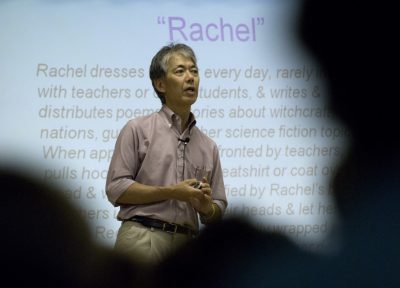Editor’s Note: The following — written by George Sugai, Neag School professor of special education, and Geoff Colvin, a retired research associate in the University of Oregon’s College of Education — was originally published in the “Guest Viewpoint” section of The Register-Guard, a local newspaper based in Eugene, Ore.

As a new school year begins, educators, families and students are gearing up with high aspirations for a successful year. However, relatively overnight we have witnessed significant changes in societal and global norms that are in sheer opposition to the norms and practices we promote in our schools. Specifically, the presidential election was associated with reports of unprecedented negativity, intolerance and disrespect.
The Southern Poverty Law Center, for example, reported 900 cases last November of harassment and intimidation in schools across the nation in which President Trump’s name was invoked by the harassers. In addition, the center disclosed that 90 percent of educators surveyed reported that the election created a negative climate in their schools that will likely have a lasting effect.
Sadly, these negative effects persist as we speak. For instance, the Unite the Right rally and torch-lit march of white nationalists in Charlottesville, Va., represented seemingly commonplace images of hate, intolerance, incivility, dishonesty and unbridled racism that children and youth are exposed to frequently. Instead of providing moral leadership for the nation on Charlottesville, the president of the United States chose to make inflammatory statements that only worsened the situation, setting the stage for further violent confrontations.
Moreover, the ongoing acts of terrorism throughout Europe, most recently in Barcelona, have exacerbated the divisions and hatred among people at a global level.
Our schools are in a prime position to support the academic, social, emotional and behavioral health of our children and youth and to counter the negativity
so prevalent in today’s society.
Of paramount concern to us is the effect that these messages of negativity may have on our children. Many years of published research (e.g., the U.S. Surgeon General’s report) warn that what children see and hear about the world through the media influences how they behave.
As the new school year begins, we appeal to all educators, school leaders and family members to redouble their efforts to actively resist and prevent the negative influence these troubling trends may have on the growth, development and education of our children and youth. How can this be done?
It is immediately within the purview of schools to 1) systematically model, encourage, and formally “teach” civil, safe and responsible behavior to promote and model respect for differences and diversity; 2) reject dehumanizing behavior, and 3) stand up for children and youth who are victimized by hate and discrimination. We cannot afford to wait and hope for the negative public discourse to simply go away.
Fortunately, we have teaching practices and effective models with strong evidence to guide this doubling-up effort. For example, in the early 1990s, the U.S. Department of Education funded a project we developed in the College of Education at the University of Oregon designed to shift school practice from reactive, exclusionary and negative discipline to more preventive, inclusionary and positive support.
Initially, this federally funded project was piloted in three local school districts, and then expanded to schools throughout Oregon and other states. The current form of this project, called Positive Behavioral Interventions and Supports, widely adopted in Lane County schools and throughout the state of Oregon, has been tested and implemented in more than 25,500 schools across the United States and adopted internationally (e.g. Canada, Europe, Asia, Australia, Africa, New Zealand and the Caribbean).
More than 20 years of research results indicate meaningful and sustained improvements in school discipline, academic achievement, school climate, school attendance and related social behavioral outcomes (see pbis.org).
Given the 180-day school year and the six-hour school day, our schools are in a prime position to support the academic, social, emotional and behavioral health of our children and youth and to counter the negativity so prevalent in today’s society.
Our schools must act decisively and urgently to (re)teach, model and encourage behavior that nurtures and maintains our most cherished individual and collective values of civility, diversity, equity, responsibility and freedom of expression that serve as the foundation of our democracy.
The tools are available. It can be done.
Malala Yousafzai, in her inspiring story of survival from terrorism, “I am Malala: The Girl Who Stood Up for Education and Was Shot by the Taliban” (2013), expressed our message most poignantly: “Let us pick up our books and our pens. They are our most powerful weapons. One child, one teacher, one book, and one pen can change the world.”
Geoff Colvin of Eugene is a retired research associate in the University of Oregon’s College of Education. George Sugai is a former professor at the UO and currently a professor at University of Connecticut’s Neag School of Education.
 Facebook
Facebook
 Twitter
Twitter
 LinkedIn
LinkedIn
